This is our simple statement as we launched the first MBA in Sustainable Management in the US (many tell us the first on the planet). See the “Origins of Presidio’s Founding Educational Philosophy” essay written by Dwight Collins, PhD, Founding Faculty member and Dean Emeritus.
Presidio Graduate School Founding Premise:
“If we develop and launch a future/systems-oriented, values-driven integrative educational practice, Presidio World College (now Presidio Graduate School) would then be making a unique contribution in the long, rich historical tradition of Western University “Liberal Arts and Science” education of citizens.” Ron Nahser, PhD. Provost Emeritus (Founding Provost.) See” Presidio Founding Educational Philosophy: A Reflection”
We introduced this founding educational philosophy – developed from 2002-2004, building on earlier educational vision, models, and methods of the two co-founders – see below – to the academic world at University of Oxford Department of Education Studies, “8th Conference for the Study of Values in Education and Business” in 2006. And here is the curriculum presented:
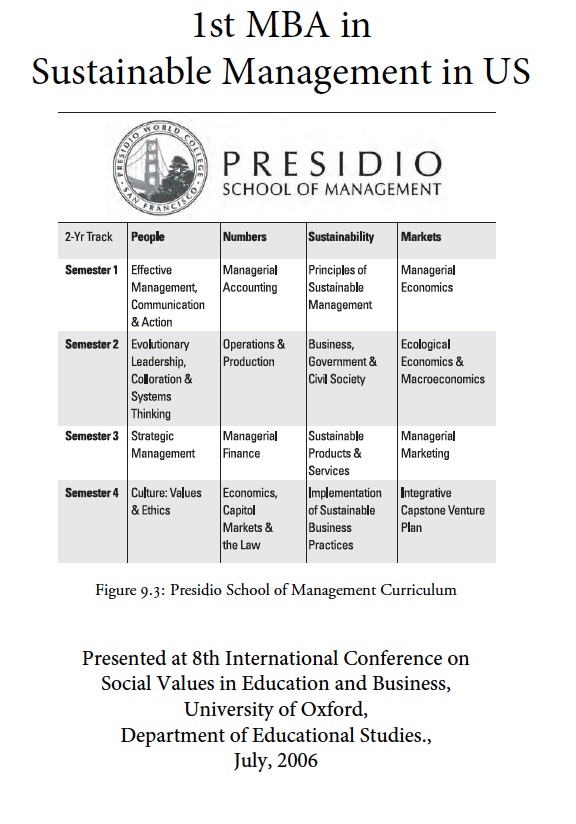
The original vision for the school’s educational model came from Dick Gray’s insight into the best way for students to learn. He presented it graphically in his dissertation:
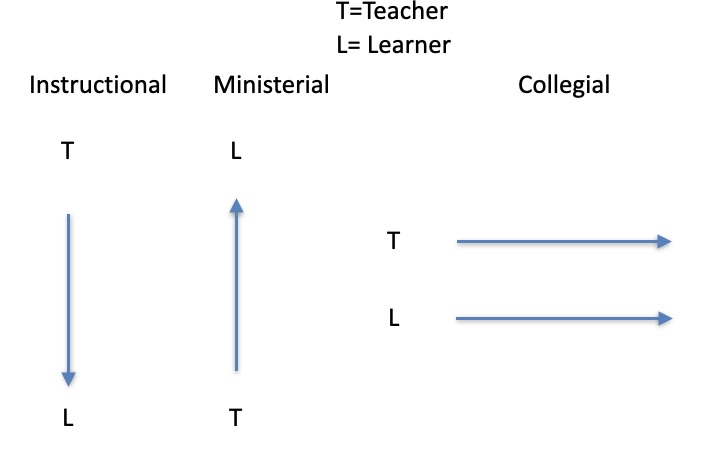
The diagram is elegant and intuitive/self-explanatory. The Instructional model is where the teacher imparts knowledge to the student. In the MBA, these are the traditional subjects such as Marketing, Economics, Finance, Accounting, Operations and Sustainability. In the Ministerial model the focus is on the student to help them develop: the Leadership/OD curricula. Both these models of course have a central place. But the Collegial model is where the teacher and learner work together to explore some problem or issue.
In Gray’s mind and educational experience, this is “where we can readily see that how one learns is every bit as important as what one learns. If we really believe that individual development takes precedence over social efficiency, then all education should be directed toward self-education, which requires self-discipline, self-guidance, and self-evaluation in about equal parts. [This does] not minimize the importance of what one learns.”
It is in the Collegial model that Gray saw true education taking place: “It is in the creative willing of a new relationship, a new thing, or a new idea, that development takes place.”
He goes on: “The collegial relationship of teacher and learner rests upon the proposition that learning is most effectively stimulated by the opportunity to solve problems and thus to master an area of interest, which is to say a realm of objects of value, to the learner.”
With this educational vision, Gray was joined by Steven Swig who describes his journey to management education this way.
“Early in my career I helped rich people get richer by taking working people’s money and putting it back into the pockets of the wealthy (as an M&A lawyer) – I didn’t feel good about my work. Many of the executives I represented had MBAs from major business schools that were teaching the ‘finance model’ – make as much as you can, no matter the consequences. I instinctively knew this wasn’t right, or fair, or sustainable for me, or for anyone else. I knew we could do better.”
And so, In 1997, Swig joined Gray and they co-founded what was then called Presidio World College, launching the MBA in Sustainable Management in 2003..
Values and “Calling”
And that brings us to the question of how to practice the collegial model which is where the Arc of Pragmatic Inquiry comes in, especially concerning the fundamental importance of values. Here is how Jim Collins of ” Good to Great” fame linked values to strategy/tactics in his earliest work:
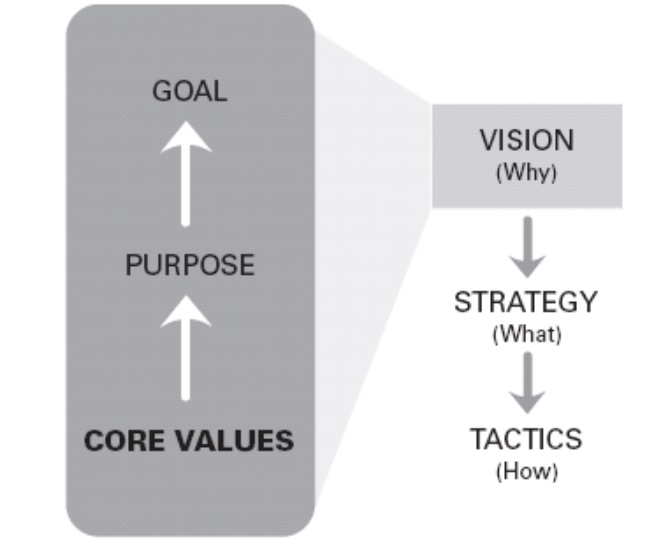
We have found this useful to make the point of exactly how foundational the core values are since they are the source of motivation driving the organization’s existence to perform. And that again is the connection with pragmatism. As we often say: “don’t tell me your values, show me your budget and your strategies and tactics. That will tell us what your values are.”
So at Presidio, we ask the students in their application essay and then at the introductory residency: ” why are you getting your MBA in sustainable management?” And ” What are your ideas to change the world?”
Here is how we presented it:

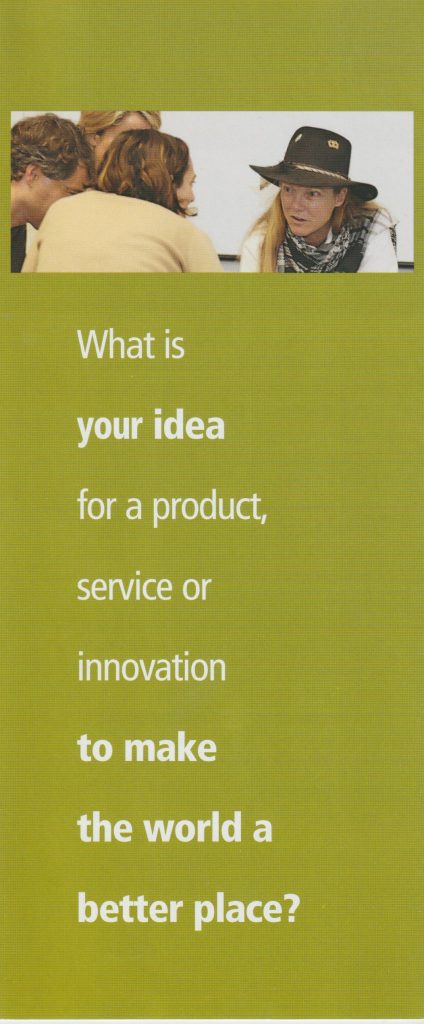
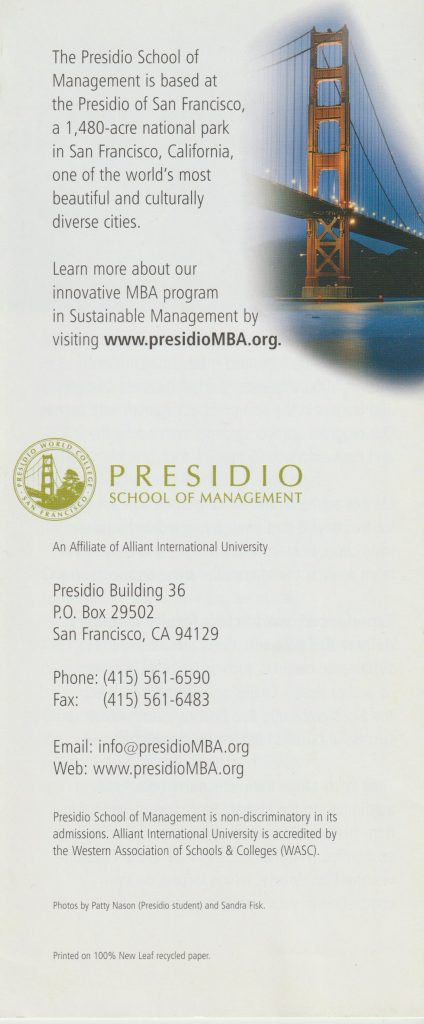
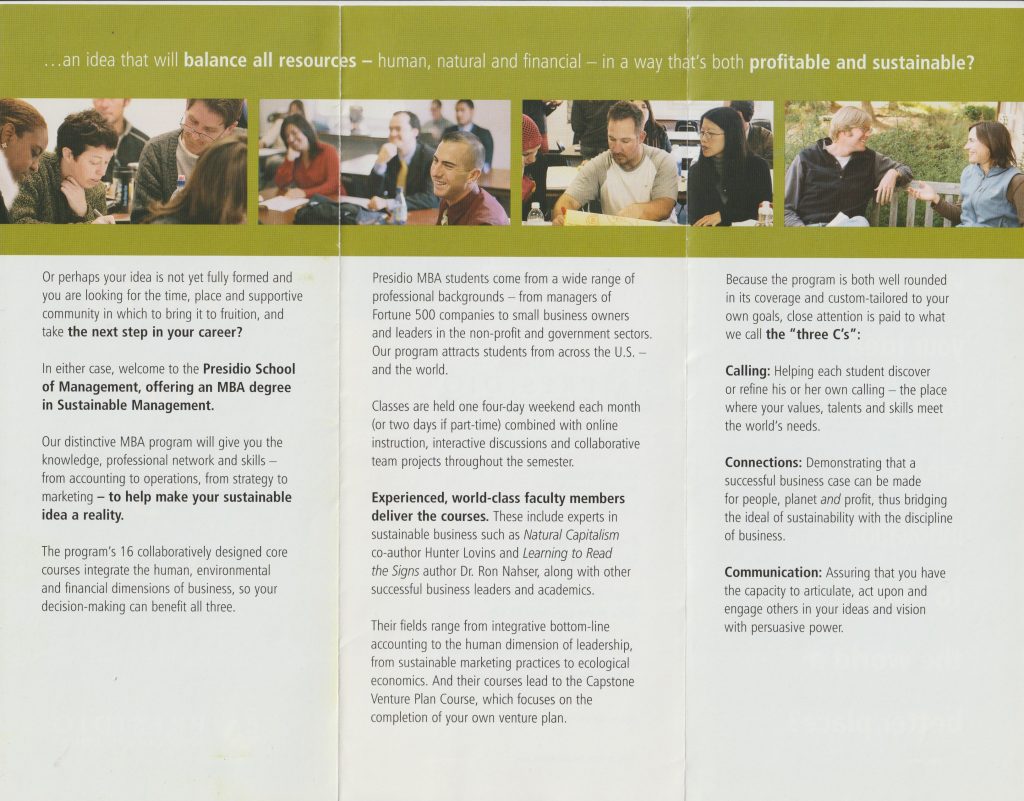
Inside spread of brochure
The students then go through the curriculum, but always circling back to test and further develop their original ideas and values. They begin on day 1 with a Pre-work assignment to start with some initial thoughts or “inklings.” In their final semester, they develop a Capstone project – their “Big Idea” – a strategic plan to interrupt a present macromarket ecosystem with some product or service which will benefit the user so all life – personal, social and environmental – can flourish. Gray often said that values are not taught but caught. And that is the idea of a “calling”, some idea or career path which the student is drawn to. Gray Himself felt called to the work that led him to his academic degrees and founding two schools. Here is the poem – “The Call” – that was found on his computer, finished shortly before he died.
With Steven Swig as President and Co-founder and Ron Nahser as Provost, sharing the CEO title, here is how Dick Gray described how to utilize the practice of Pragmatic Inquiry to discern “calling” to the Presidio community.
That is different from a “job” which is something someone else wants you to do. A “career” which is what you want to do. The “calling” often continually comes to us as something we must do. We show this graphically – and call into question the source – as a hierarchy of aspiration and inspiration, leading to a life of flourishing/well-being/happiness:
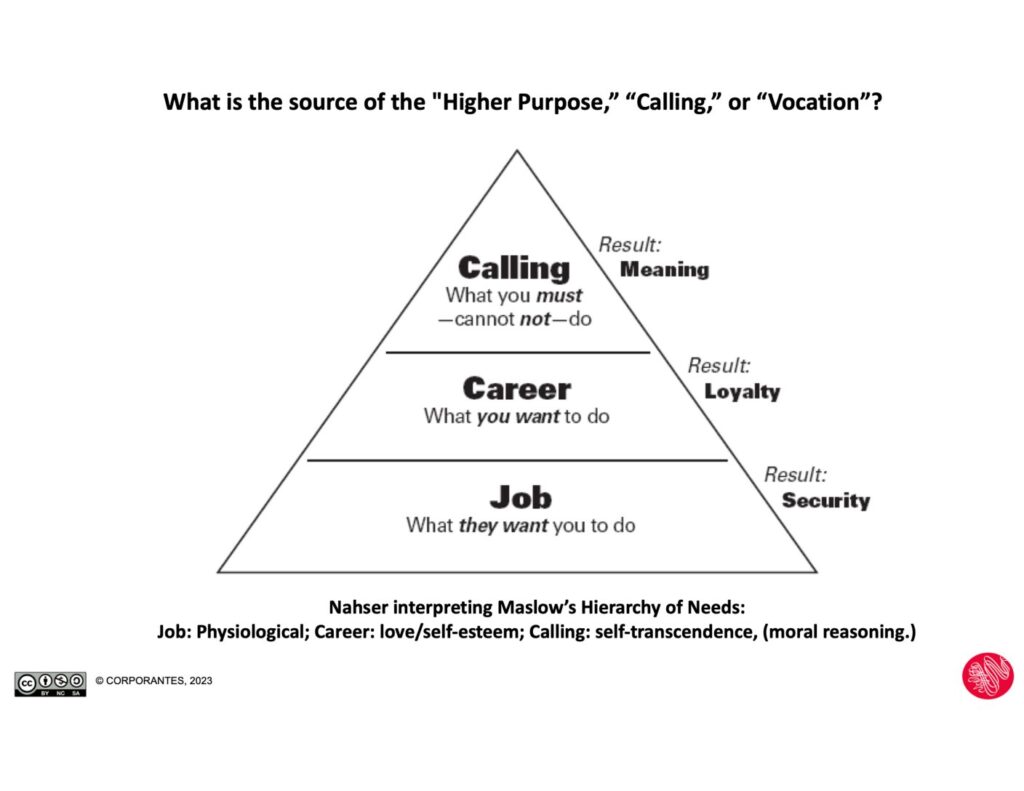
This is how this foundational education philosophy was presented to the Presidio board of trustees during the launch:
Goal: “Focus on creating a unique, world-class educational environment to learn the methods and practices to transform the world so that life flourishes, not simply to teach methods to reduce un-sustainability.
Strategy: The curriculum is a carefully designed arc of pragmatic inquiry through a sequence of courses and experiences to be transformative for the student: learning, testing, exploring possibilities and developing the next steps in their careers leading to implementing plans to “change the world.” (NYT2015)
Result: Distinctive Brand Promise – Come to Presidio to Discover What You Must Do to Change the World…Your “Calling.”
Reason to believe: Pioneers in Sustainable Management Education…pioneering again.
Transforming Management Education
(“…the primary task of education in a democratic society is the cultivation of unique, creative individuals.” Richard Gray from his dissertation: “ Beyond Conformity: A Study of Individuality in the College Community.”)
“Our ultimate aspiration is that every business school on the planet should look like us.” Dwight Collins, Dean.
(See original story in Poets and Quants and previous page on Academic Case Histories.)
We are presently working with other management educators and practitioners to demonstrate how to implement the experience practiced for the first time as “Experiential Learning (EL) and the Arc of Pragmatic Inquiry (API)” at the Presidio Graduate School 2 year/4 semester program level. This proved to be a major step forward in bringing a sustainable management curriculum with a values foundation to life to further their mission: “To educate change makers to build a flourishing future for all.” This is a higher, better defined, and more inspirational mission than one of reducing un-sustainability in the world, too often the goal of many other programs.
“… how one learns is every bit as important as what one learns.” Richard Gray, “Beyond Conformity: A Study of Individuality in the College Community.” p. 116.
Any program that aims to be “radical” and “transformative” must modify the underlying assumptions at work in most of higher education. It must transition:
· from a focus on mastery of content to mastery of inquiry; i.e. from content-centric to student-centric.
· from mastery of skills to mastery of method.
· from accumulation of discrete knowledge to an ongoing process of learning.
· from curriculum, or courses of study in a school or college, to domains of inquiry.
· from courses of specified content over a specific duration of time to a demonstration of sufficient inquiry through the use of mentor feedback.
The central themes are pragmatic inquiry (linking American Pragmatism with the “critical realism” of Bernard Lonergan) and experiential learning as the pedagogic backbone, and replacing “sustainability” as the coalescing concept with “flourishing.” The result is the student’s ability to articulate a case – an example of a Capstone statement – for developing a sustainable strategy to provide some good or service – through profit, non-profit and/or government (multi-sector) organizations and communities – which will attract investment from all kinds of stakeholders: financial, social, employees, customers, citizens.
“ Only disciplined reflection on experience leads to learning that lasts.” Richard Gray,
Successful implementation of the API-EL method combination in conjunction with a transformative MBA curriculum in which every course in the MBA curriculum had a sustainability – environmental and social – dimension made the Presidio Graduate School the first MBA in Sustainable Management in the US – and many say first in the world. Its approach demonstrates how the combination of focus on the student’s search for meaning and a curriculum suffused with sustainability generates graduates who know how to practice business with flourishing and the common good as its primary focus.
The program of a one-week student seminar providing an overview of such a transformative academic offering can be found here. This seminar was sponsored by a partnership between the Presidio Graduate School and the business school of Universidad EAN in Bogota. The PathFinder Field Notebook provided a framework through which the students followed the Arc of Pragmatic Inquiry practice during the week to develop a product or service innovation which they presented on the last day.
The model cannot be “scaled” in the traditional sense because, as you have seen from above, the collegial model is based on learning-community engagement and practice. Each school will, of course, practice the API-EL model within their unique mission, strategy and culture.
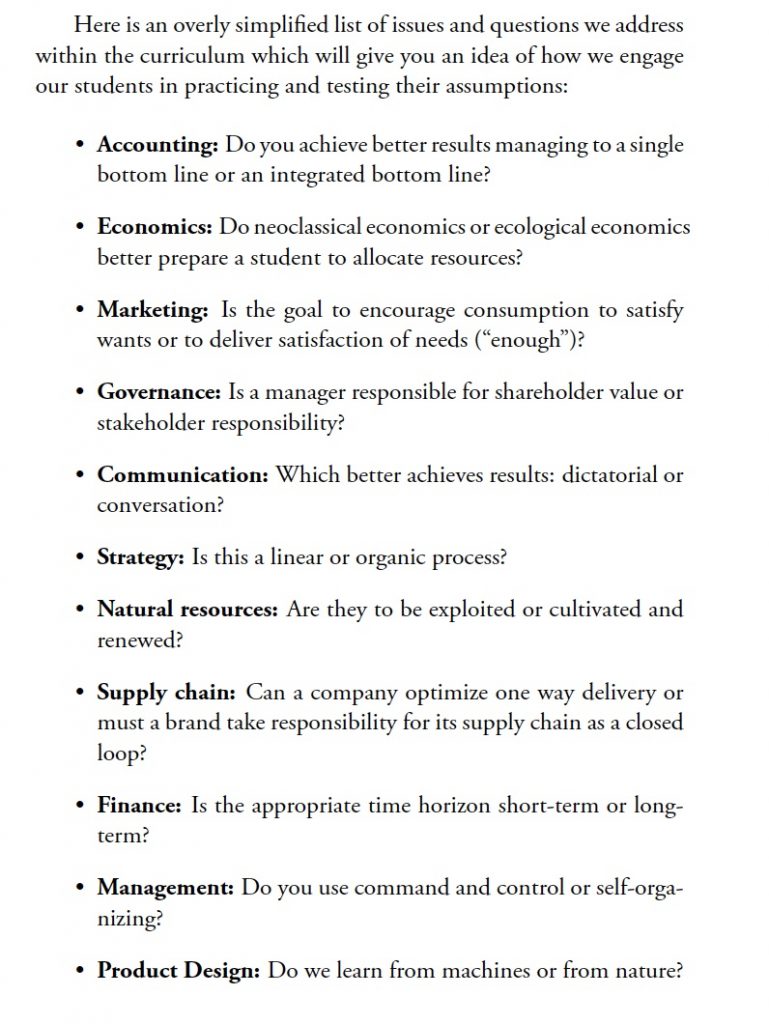
University of Oxford, Department of Educational Studies., July, 2006
Mission: “To Educate Change-makers To Build a Flourishing Future for All”
The current mission statement building on this original goal : to educate change makers to build a flourishing future for all. (See also “Academic Case Histories” page, and references to the two founding dissertations.)
This goal is of central importance for society today since as Alfred North Whitehead said in his 1931 talk on “Foresight” at the Harvard Business School: “The behavior of the community is largely dominated by the business mind. A great society is one in which its men [and women] of business think greatly of their function.”
He went on: “Philosophy is an attempt to clarify those fundamental beliefs which finally determined the emphasis of attention that lies at the base of character.”
Exactly our point in helping students discern, focus and ignite their values and be able to express ideas/plans/strategies to “change the world.” Since economics and business thinking is shaping society’s perspective of the Common Good…finding their “calling”…a life of meaning and purpose…their work pursuing their calling/purpose will indeed change the world. Paraphrasing Margaret Mead: “…indeed it is the only thing that ever has.”
And finally, we often ended our recruitment open houses in the early days of Presidio School of Management by stating that while business, science and philosophy are critical, poets should have the last word: ” Tell me, what is it you plan to do with your one wild and precious life?” (Mary Oliver, “The Summer Day.”)
Still the fundamental/existential questions for us all.

